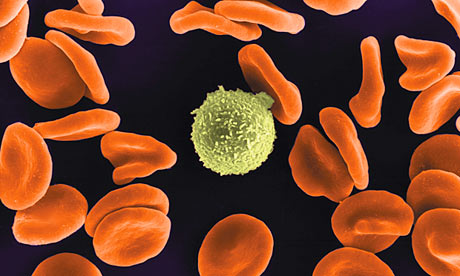Red and white blood cells. Bute can cause aplastic anaemia, in which the bone marrow fails to produce enough new blood cells. Photograph: G Wanner/Getty Images/ScienceFoto RM
Is horsemeat safe?
Horses are regularly treated with an anti-inflammatory drug called phenylbutazone, known as bute. However, bute is banned from the human food chain. No horse that has ever received the drug, no matter how long ago, is meant to be slaughtered for meat for human consumption. Since much of the trade in horsemeat that has been passed off as beef involves criminal activity, there are fears that those running the trade will have ignored food safety and hygiene regulations.
How dangerous is bute?
Bute can cause a potentially fatal blood disorder in humans called aplastic anaemia, in which the bone marrow fails to produce enough blood cells. Because it is not possible to say what triggers the disorder, it is not possible to identify a safe level of residue in meat.
What's the risk?
Aplastic anaemia is rare. Historic evidence suggests around one person in 30,000 exposed to bute when used as a human medicine suffered a serious side-effect, but they were exposed to significantly higher doses than any residue likely to have entered the food chain. Residues found in horses testing positive for bute have been a thousandth of the therapeutic human dose. The Food Standards Agency advice has been that the risk exists but is very low.
Why has the government chopped and changed on safety?
Until the authorities know the source of the horses that have illegally been used to adulterate cheap beef products, they cannot say whether they were checked for bute or not and therefore whether there is a food safety risk. Since no one was testing for horse in beef until recently, they were not testing for bute either. Last week the government changed the rules and decided that no horse slaughtered in the UK would be allowed to enter the food chain until it had been tested and cleared. Before that officials only ordered tests on horses whose passports looked suspicious. Results of the new tests were released on Thursday. Of 206 horses tested under the new regime, eight tested positive for bute.
Where does horsemeat come from?
The authorities are still struggling to identify the precise chain by which horsemeat got into supermarket and fast-food burgers and ready meals. But it is known that there is a substantial trade in horses with fake passports between Ireland and the UK. Animal welfare groups believe there are more than 70,000 Irish horses that have not been accounted for. Thousands of tonnes of horsemeat is also imported to Europe each year from North America and Mexico, usually through Belgium. The American trade has also been bedevilled with false documents and drug contamination.


